人教新起点英语三年级下册重点知识汇总
(完整版)人教版小学三年级下册英语知识点归纳.docx
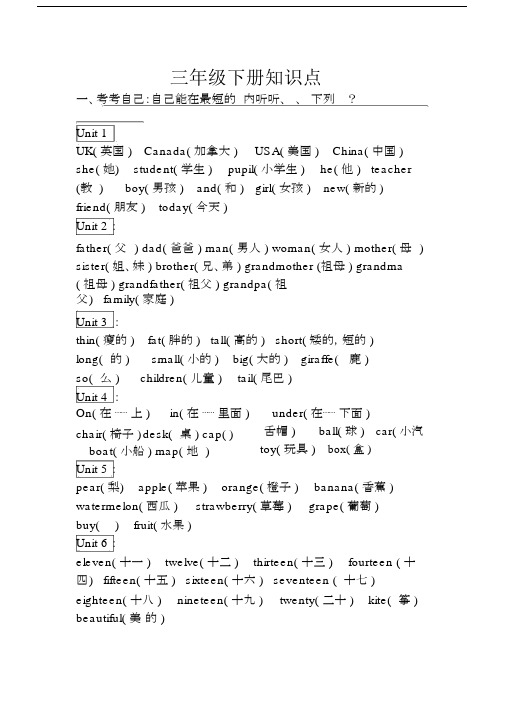
三年级下册知识点一、考考自己:自己能在最短的内听听、、下列?Unit 1UK( 英国 ) Canada( 加拿大 ) USA( 美国 ) China( 中国 ) she( 她) student( 学生 ) pupil( 小学生 ) he( 他 ) teacher (教 ) boy( 男孩 ) and( 和 ) girl( 女孩 )new( 新的 )friend( 朋友 ) today( 今天 )Unit 2 :father( 父 ) dad( 爸爸 ) man( 男人 ) woman( 女人 ) mother( 母 ) sister( 姐、妹 ) brother( 兄、弟 ) grandmother (祖母 ) grandma ( 祖母 ) grandfather( 祖父 ) grandpa( 祖父) family( 家庭 )Unit 3:thin( 瘦的 )fat( 胖的 ) tall( 高的 ) short( 矮的,短的 )long( 的 )small( 小的 )big( 大的 )giraffe( 鹿 )so( 么 )children( 儿童 )tail( 尾巴 )Unit 4:On( 在⋯⋯上 ) in( 在⋯⋯里面 )chair( 椅子 )desk( 桌 ) cap( ) boat( 小船 ) map( 地 )under( 在⋯⋯下面 )舌帽 ) ball( 球 )car( 小汽toy( 玩具 )box( 盒 )Unit 5 :pear( 梨) apple( 苹果 ) orange( 橙子 ) banana( 香蕉 ) watermelon( 西瓜 ) strawberry( 草莓 ) grape( 葡萄 )buy( )fruit( 水果 )Unit 6 :eleven( 十一 ) twelve( 十二 ) thirteen( 十三 ) fourteen ( 十四) fifteen( 十五 ) sixteen( 十六 ) seventeen ( 十七 ) eighteen( 十八 ) nineteen( 十九 ) twenty( 二十 ) kite( 筝 ) beautiful( 美的 )二、牢记下面的对话,会让你的英语说得更好!更棒!1、欢迎别人时应该说――A: Welcome! ( 欢迎 !)B: Welcome! ( 欢迎 !)2、问别人介绍朋友的名字应该说-―― A:This is Amy.这是艾米。
人教新起点三年级英语下册知识归纳总结

人教新起点三年级英语下册各单元知识归纳总结Unit 1知识点归纳一、重点单词。
Chinese 语文;汉语(的) English 英语(的) science 科学PE 体育music 音乐maths 数学art 美术computer class 计算机课we 我们that 那,那个二、重点句型1. A: What classes do you have on Monday?你星期一上什么课?B: We have English and music.我们有英语和音乐。
C: We have Chinese, art and science.我们有语文,美术和科学。
D: We have maths, PE and computer class.我们有数学,体育和计算机课。
2. A: Do you like computer class? 你喜欢计算机课吗?B: Yes, I do. 是的,我喜欢。
3. A: Do you like art? 你喜欢美术吗?B: No, I don’t. 不,我不喜欢。
4. A: Do you like PE?你喜欢体育吗?B: Yes, I do. 是的,我喜欢。
5. A: Do you like PE?你喜欢体育吗?B: No, I don’t. I like music. 不,我不喜欢。
我喜欢音乐。
三、四会单词和四会句型Chinese 语文;汉语(的) English 英语(的) science 科学PE 体育music 音乐maths 数学art 美术computer class 计算机课1. A: What classes do you have on + 星期? 你星期......上什么课?B: We have + 科目1(+,科目2,and + 科目3).我们有......和......2. A: Do you like + 科目? 你喜欢......吗?B: Yes, I do. /No, I don’t. 是的,我喜欢。
新起点三年级英语下册知识点总结
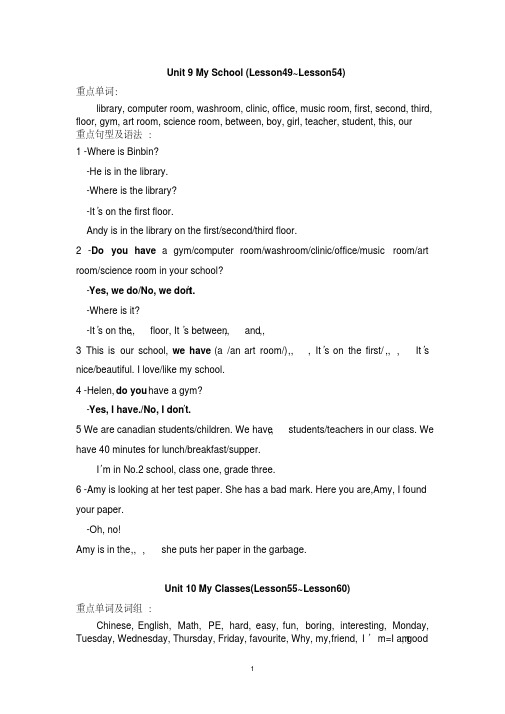
Unit 9 My School (Lesson49~Lesson54)重点单词:library, computer room, washroom, clinic, office, music room, first, second, third, floor, gym, art room, science room, between, boy, girl, teacher, student, this, our重点句型及语法:1 -Where is Binbin?-He is in the library.-Where is the library?-It’s on the first floor.Andy is in the library on the first/second/third floor.2 -Do you have a gym/computer room/washroom/clinic/office/music room/art room/science room in your school?-Yes, we do/No, we don’t.-Where is it?-It’s on the,,floor, It’s between,,and,,3 This is our school, we have(a /an art room/),,, It’s on the first/,,,It’s nice/beautiful. I love/like my school.4 -Helen, do you have a gym?-Yes, I have./No, I don’t.5 We are canadian students/children. We have,,students/teachers in our class. We have 40 minutes for lunch/breakfast/supper.I’m in No.2 school, class one, grade three.6 -Amy is looking at her test paper. She has a bad mark. Here you are,Amy, I found your paper.-Oh, no!Amy is in the,,,she puts her paper in the garbage.Unit 10 My Classes(Lesson55~Lesson60)重点单词及词组:Chinese, English, Math, PE, hard, easy, fun, boring, interesting, Monday, Tuesday, Wednesday, Thursday, Friday, favourite, Why, my, f riend, I’m=I am, goodmorning, good afternoon, meet, too, goodbye, turn on, turn off重点句型及语法:1 -Tom, do you like Chinese/English/math/PE/music/art/science/computers?-Yes, I do.It’s interesting/easy/fun 肯定回答-No, I don’t. It’s boring/hard (for me). 否定回答2 -What classes do you have on Monday/Tuesday/,,?-I have Chinese/,,3 Bill has PE on Monday. He l ikes math. He doesn’t like English.Lily has math on Tuesday. She likes music. She d oesn’t like math.4 -What’s your favourite class?/What class do you like?-Math./I like music.-Why?-It’s fun.5 -When do you have math/English/Chinese/PE/computers/art/science class?-Monday.6 -I have English class on Monday. 肯定式-I don’t have English class on Monday. 否定式Unit 11 After School Activities(Lesson61~Lesson66)重点单词及词组:after school, activity, club time, play the drum, sing songs, draw pictures, play chess, do art projects, play soccer, go for a hike, have a good time, be going to, dance, turn right, bend down, dance to the music, Sunday, Saturday.重点句型和语法:1 -What do they do on Monday?-They play the drum.2 -What are you going to do after school?-I am going to play the drum/sing songs/draw pictures/play chess/do art projects/play soccer/ dance/ride my bike/fly my kite. (I)-That’s sounds interesting, I am going to,,,too.3 -What is Lily going to do after school?-She is going to,,Lily/Yaoyao/Jhon/Andy/Binbin/Bill is going to,,(he,she,it)4We are going to,,(we)Yaoyao and Binbin are going to,,(they)5 -Are you going to,,?(you)-Yes, are you going to play?-Oh, yes, that sounds like more fun,just a minute.重点句型及语法:Unit 12 Revision (Lesson67~Lesson72)重点句型:1 -What are you going to,,/What is Lily going to,,-We are going to,,/ I am going to,,/He(She) is going to,,2 We have,,/I have,,3 -When do you have music class?-Monday4 -Do you like,,?-Yes, I do./ No,I don’t. (单数)-Yes, we do./No,we don’t.5 -Where is Lily?-She is in the library on the first floor.Unit 13 My Home (Lesson73~Lesson78)重点单词及词组:living room, dining room, kitchen, bedroom, study, bathroom, balcony, garage, armchair, telephone, own, desk, teddy bear, closet.重点句型及语法:1 -Where is the cat?-It’s on the balcony. / It’s in the dining room.2-Where is the tiger’s room?-It’s in the forest.3-What’s in the forest?-There is a tiger./ There are two cats4 -Is there a bathroom/living room/kitchen/bedroom/study/balcony/garage in your home?-Yes, there is.肯定回答-N, there isn’t.否定回答5 -What room is it?-It’s the kitchen/dining room/bedroom/study/bathroom.6 Cookie is a naughty cat. Cookie goes to the bathroom,falls into the bathtub,knocks over the garage can, runs into the closet.Unit 14 My Family (Lesson79~Lesson84)重点单词及词组:Family, people, grandfather, grandmother, uncle, aunt, father, mother, brother, sister, cousin, cook, waiter, dentist, nurse, manager, taxi-driver, policeman重点句型及语法:1 There are ,,people in my family. They are,,2 -What’s your father’s/mother’s/grandfather’s/uncle’s/aunt;s/brother’s/sister’s job?-He/She is a doctor/cook/waiter/dentist/nurse/manager/taxi-driver/policeman3 I’m ,,,I’m ,,years old, I’m from China/Canada/,,.There are,,people in my family, ,,and me. 形容词性的物主代词4 -Can you swim/jump/,,?-Yes, I can 肯定回答-No, I can’t 否定回答5 -Are you my mother?-Yes, I am. 肯定回答-No, I am not. 否定回答6 -Do you know my mom?-Yes. I do. 肯定回答-No, I don’t 否定回答7 -What’s ,,like?Unit15 Family Activities (Lesson 85~Lesson90)重点单词及词组:Feed the fish, wash clothes, water the flowers, cook the chicken, clean the kitchen, watch TV, listen to music, walk the dog, grandparents. On the phone重点句型及语法:1 -What are they doing? 主语是第三人称复数-They are cooking the fish/,,2-What is Lily’s /Tom’s (she/he)mom doing? 主语是第三人称单数-He/She is cleaning the floor.3-What am I doing? 主语是第一人称-You are doing,,现在进行时Unit 16 Revision (Lesson91~Lesson96)重点句型及语法:1 My father’s/mother’s/,,is my,,2 -What’s it? -It’s a ,,3-Where is it? -It’s on/in,,the,,4 -Who is she? -She is Lily.5 -What’s she doing? -She is cooking.6 -What’s in Tom’s room/the kitchen,,? -There is/are,,7 -What’s sb’s job? -He/She is a ,,下册语法汇总一、be 动词(与人称代词的搭配)1、基本形式:am、are、is(1)am第一人称I+am (注意:“I”无论何时都要大写,不管位于句首还是句中) 例:I am a girl. I am twenty. I am Lily.(2) are第二人称you+are; 一人称复数we+are;三人称复数they+are其他复数名词+are (注意:第二人称单复数同形,都为you)例:You are my good friend. We are in the same class.They are on the road. The books are on the desk.(3) is第三人称he(男) +is ; she(女)+is; it(不是人)+is;其他单数名词+is例:He\She is a good student. It is a white cat.A dog is on that street.2、肯定、否定、疑问(等于号后是简写)肯定否定——be动词后加not 一般疑问:be动词移到主语前一般疑问否定一般疑问回答肯定和否定回答I am,=I’m ,. I am not,=I'm not ...Am I,? Am not I,? Yes,I’m.No,I’m not.You are, = you’re,You are not,=You aren’t,Are you,? Are not you. ..?=Aren’t you,?Yes,you are.No,you aren’tShe\He\It is…=She\He\It is She\He\It is not…=She\He\It isn’t…Is she\he\it…? Is not she\he\it…?=Isn’t she\he\it…?Yes,she\he\It is.No,she\he\It isn’t.Weare=We’re We are not…=We aren’t…Are we…? Are not we…?=Aren’t we…?Yes,we are.No,we aren’t.They are =They’re They are not…=They aren’tAre they…? Are not they…?=Aren’t they…?Yes,they are.No,they aren’t.例:I am(not) from London.My eyes are(not) small.My hair is(not) long.Am I a Chinese? 回答:肯定:Yes, you are. 否定:No, you aren’t. Is the cat fat? 回答:肯定:Yes, it is. 否定:No, it isn’t.注意:在一般疑问回答中,肯定回答除I’m不可简写,否定回答均可简写。
人教版 三年级起点 英语 各册知识点

人教版三年级起点英语各册知识点Unit OneHello! (你好!)In the first unit of the People's Education Press third-grade English textbook, students are introduced to basic greetings and phrases to initiate communication in English. This unit aims to build a solid foundation for students in learning English as a foreign language. Let's delve into the key points covered in Unit One.1. Greetings and Self-introduction(问候和自我介绍)In this section, students learn how to greet others in English. They acquire essential expressions such as "Hello", "Goodbye", "Nice to meet you" and "What's your name?". These phrases enable students to initiate conversations confidently.2. Classroom Language(课堂用语)In this part of the unit, students become familiar with common English expressions used in the classroom setting. They learn phrases like "Sit down", "Stand up", "Open your book", and "Close your book". These phrases help students understand and follow instructions during the class.3. Numbers(数字)Numbers are an essential part of any language, and English is no exception. In this section, students learn how to count from one to twenty inEnglish. They also practice saying various numbers in English, enhancing their numeracy skills.4. Colors(颜色)Colors play a significant role in our daily lives. In this part, students learn the names of different colors in English, such as "red", "blue", "yellow", and "green". They engage in activities involving color recognition, allowing them to associate English words with visual representations.5. Classroom Objects(教室物品)To facilitate better understanding and communication, students must learn the names of common objects found in the classroom. In this section, they are introduced to words like "desk", "chair", "book", and "pen". Knowing these terms enables them to navigate a classroom environment efficiently.6. Classroom Actions(课堂动作)In this final section of Unit One, students learn various classroom actions in English. They become familiar with phrases such as "Write", "Read", "Listen", and "Speak". These actions encourage active participation in classroom activities, fostering language learning and communication skills.Overall, Unit One of the People's Education Press third-grade English textbook provides young learners with a solid foundation in basic greetings, self-introduction, classroom language, numbers, colors, classroom objects, and actions. By mastering these key points, students are equipped with fundamental English language skills necessary for further learning.Remember, practice is the key to success in language acquisition. So, keep practicing and make learning English enjoyable!。
三年级下册重点英语单词人教版
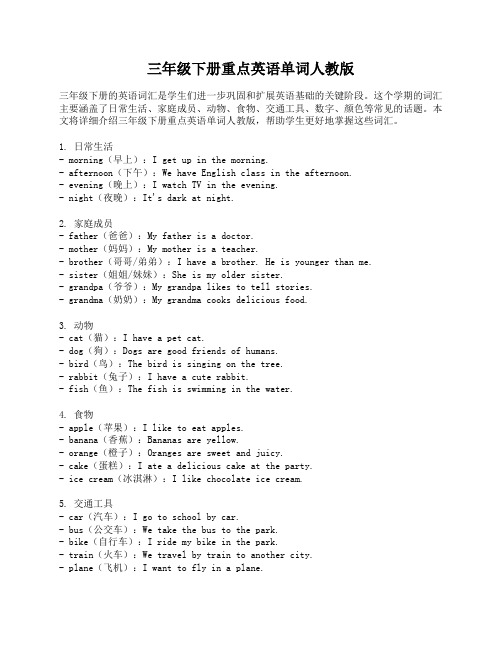
三年级下册重点英语单词人教版三年级下册的英语词汇是学生们进一步巩固和扩展英语基础的关键阶段。
这个学期的词汇主要涵盖了日常生活、家庭成员、动物、食物、交通工具、数字、颜色等常见的话题。
本文将详细介绍三年级下册重点英语单词人教版,帮助学生更好地掌握这些词汇。
1. 日常生活- morning(早上):I get up in the morning.- afternoon(下午):We have English class in the afternoon.- evening(晚上):I watch TV in the evening.- night(夜晚):It's dark at night.2. 家庭成员- father(爸爸):My father is a doctor.- mother(妈妈):My mother is a teacher.- brother(哥哥/弟弟):I have a brother. He is younger than me.- sister(姐姐/妹妹):She is my older sister.- grandpa(爷爷):My grandpa likes to tell stories.- grandma(奶奶):My grandma cooks delicious food.3. 动物- cat(猫):I have a pet cat.- dog(狗):Dogs are good friends of humans.- bird(鸟):The bird is singing on the tree.- rabbit(兔子):I have a cute rabbit.- fish(鱼):The fish is swimming in the water.4. 食物- apple(苹果):I like to eat apples.- banana(香蕉):Bananas are yellow.- orange(橙子):Oranges are sweet and juicy.- cake(蛋糕):I ate a delicious cake at the party.- ice cream(冰淇淋):I like chocolate ice cream.5. 交通工具- car(汽车):I go to school by car.- bus(公交车):We take the bus to the park.- bike(自行车):I ride my bike in the park.- train(火车):We travel by train to another city.- plane(飞机):I want to fly in a plane.6. 数字- one(一):There is one apple on the table.- two(二):I have two books.- three(三):I can count to three.- four(四):I have four pencils.- five(五):I have five fingers on each hand.7. 颜色- red(红色):I like to wear a red dress.- blue(蓝色):The sky is blue.- yellow(黄色):The sun is yellow.- green(绿色):Grass is green.- purple(紫色):My favorite color is purple.8. 季节- spring(春天):Spring is a beautiful season.- summer(夏天):It's hot in the summer.- autumn(秋天):Autumn is the season for harvest.- winter(冬天):Winter is the coldest season of the year.9. 天气- sunny(晴朗的):Today is a sunny day.- cloudy(多云的):The sky is full of clouds.- rainy(下雨的):Don't forget to take an umbrella when it's rainy. - windy(有风的):The wind is strong today.- snowy(下雪的):It's snowy and we can make a snowman.10. 方向- up(向上):The bird flies up.- down(向下):Please sit down.- left(向左):Turn left at the traffic lights.- right(向右):Turn right and you will see the park.- straight(直走):Go straight and you will reach the school.11. 身体部位- head(头):I have a headache.- eyes(眼睛):Eyes are used for seeing.- ears(耳朵):Ears are used for hearing.- nose(鼻子):I can smell the flowers with my nose.- mouth(嘴巴):I eat food with my mouth.12. 衣物- shirt(衬衫):I wear a white shirt.- pants(裤子):These pants are too big for me.- shoes(鞋子):These shoes are comfortable.- dress(裙子):This dress is beautiful.- coat(外套):I need a warm coat for winter.13. 学校- school(学校):I go to school every day.- teacher(老师):My teacher is very kind.- student(学生):I am a student.- classroom(教室):We study in the classroom.- library(图书馆):I like to read books in the library.14. 月份- January(一月):January is the first month of the year.- February(二月):February has 28 days.- March(三月):March comes after February.- April(四月):April is the month for Easter.- May(五月):May is the fifth month of the year.15. 星期- Monday(星期一):Monday is the first day of the week.- Tuesday(星期二):Tuesday comes after Monday.- Wednesday(星期三):Wednesday is the middle of the week.- Thursday(星期四):Thursday is the day before Friday.- Friday(星期五):Friday is the last day of the school week.以上是三年级下册重点英语单词人教版的详细列表,希望这些词汇能够帮助学生们更好地学习英语,并能够熟练运用到日常生活和学习中。
2020人教版英语三年级下册各单元知识点归纳(最全版)
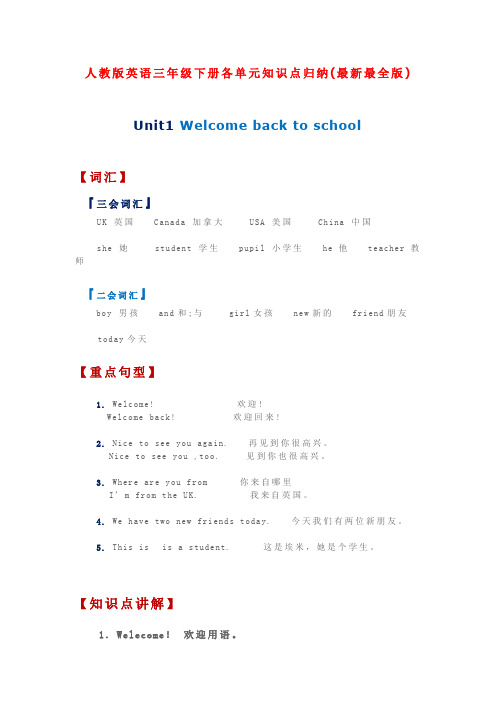
人教版英语三年级下册各单元知识点归纳(最新最全版) Unit1 Welcome back to school【词汇】『三会词汇』UK 英国Canada 加拿大USA 美国China 中国she 她student 学生pupil 小学生he他teacher教师『二会词汇』boy 男孩and和;与girl女孩new新的friend朋友today今天【重点句型】1.Welcome! 欢迎!Welcome back! 欢迎回来!2.Nice to see you again.再见到你很高兴。
Nice to see you ,too.见到你也很高兴。
3. Where are you from你来自哪里I’m from the UK.我来自英国。
4.We have two new friends today.今天我们有两位新朋友。
5.This is is a student.这是埃米,她是个学生。
【知识点讲解】1.Welecome!欢迎用语。
welcome 意为“欢迎”,用来对别人的到来表示欢迎。
2.Where are you from是询问别人来自哪里的句型Where 意为“在哪里”,用来询问地点,是特殊疑问词。
From “来自”的意思回答时用“I’m from +地点名词”。
课例:--Where are you from你来自哪里--I’m from the UK. 我来自英国3.I ’m from..... 是介绍自己来自哪里的句型。
I ’m from + 国家/城市/地名用来介绍自己的国籍或籍贯课例:I ’m from the UK. 我来自英国4.用“I’m/am +名字”介绍自己可以用句型“I’m/am +名字”来介绍自己的姓名。
表示意思是”我是......”课例:I ’m Amy. 我是埃米5.用“This is ... ”句型介绍他人“This is +人名/身份”意为“这是...”用于介绍他人互相认识。
人教版三年级下册英语知识点总结(一)

人教版三年级下册英语知识点总结(一)前言作为一名资深的创作者,我对《人教版三年级下册英语》教材的知识点进行了深入研究和总结。
在这篇文稿中,我将为大家列举出三年级下册英语的重要知识点,以帮助学生更好地掌握这门课程。
正文1. 课文内容•课文内容分为单元,每个单元都包括对话、课文、歌曲等多种形式的教学资源。
•通过课文内容,学生可以学习日常生活中常用的英语表达和句型,培养阅读理解和口语交流的能力。
2. 单词记忆•学生需要掌握每个单元中所介绍的生词,包括单词的发音、词义和用法。
•可以通过听音频、看单词卡片、做词汇练习等多种方式来记忆单词。
3. 语法知识•三年级下册的语法知识主要包括动词的时态、形容词的比较级和最高级、以及一般疑问句的构成等。
•学生需要掌握这些语法知识,并且能够在实际应用中正确运用。
4. 句型构造•学生需要学会构造简单的句子,包括肯定句、否定句和一般疑问句等。
•通过练习,学生可以提高句子构造的能力,进一步提升英语的口语表达能力。
5. 听力练习•听力练习是提高听力理解能力的重要方法,学生需要听录音,理解对话或短文中的内容,并回答问题。
•听力练习可以通过课本自带的录音或者其他辅助资源进行。
6. 口语练习•口语练习对于英语学习来说至关重要,学生应该多与同学或老师进行口语交流,提高英语口头表达能力。
•通过模仿、对话、角色扮演等方式,学生可以逐渐提升口语表达的流利度和准确性。
结尾通过对《人教版三年级下册英语》的知识点进行总结,我希望能够帮助学生更好地理解和掌握这门课程。
只有通过不断地练习和实践,学生才能在英语学习中取得进步。
我相信,只要坚持努力,大家一定能够取得优异的成绩。
希望这份总结对学生们的学习有所帮助!。
人教PEP版三年级下册小学英语全册单元知识点小结
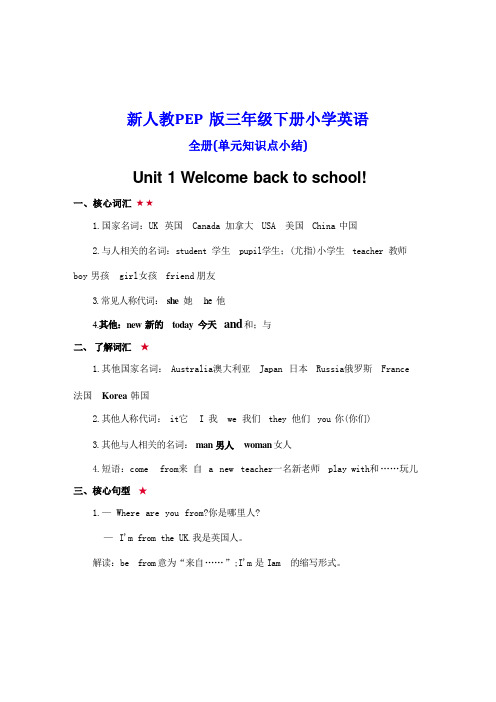
新人教PEP版三年级下册小学英语全册(单元知识点小结)Unit1Welcome back to school!一、核心词汇★★1.国家名词:UK 英国Canada 加拿大USA 美国China 中国2.与人相关的名词:student 学生pupil学生;(尤指)小学生teacher 教师boy 男孩 girl女孩friend 朋友3.常见人称代词:she她he 他4.其他:new新的today今天and和;与二、了解词汇★1.其他国家名词: Australia澳大利亚Japan 日本Russia俄罗斯France 法国Korea韩国2.其他人称代词:it它 I 我 we 我们they 他们you 你(你们)3.其他与人相关的名词:man男人woman女人4.短语:come from来自 a new teacher一名新老师play with和……玩儿三、核心句型★1.— Where are you from?你是哪里人?—I'm from the UK.我是英国人。
解读:be from 意为“来自……”;I'm是Iam 的缩写形式。
拓展;这是询问他人是哪里人的句型,其中be from可以替换为come from。
2.—Nice to see you again.再见到你们很高兴。
—Nice to see you,too.见到您也很高兴。
解读:“Nice to see you.”是日常见面常用的问候和寒暄用语。
3.Hi,I'm Amy.I'm from the UK.嗨,我是埃米。
我是英国人。
4.This is Amy.She's a new student.这是埃米。
她是一名新学生。
四、了解句型★1.Welcome!欢迎!2.We have two new friends today.今天我们有两个新朋友。
3.What about you?=How about you?=And you?你呢?解读:这三个句子可以通用,通常用于回答完别人的问题后,用同样的问题反问对方,希望对方回答相同的问题。
- 1、下载文档前请自行甄别文档内容的完整性,平台不提供额外的编辑、内容补充、找答案等附加服务。
- 2、"仅部分预览"的文档,不可在线预览部分如存在完整性等问题,可反馈申请退款(可完整预览的文档不适用该条件!)。
- 3、如文档侵犯您的权益,请联系客服反馈,我们会尽快为您处理(人工客服工作时间:9:00-18:30)。
人教新起点英语三年级下册知识点汇总一、词汇Chinese 语文;汉语(的) English 英语(的) science 科学 PE 体育 music 音乐 maths 数学 art 艺术computer class 计算机课 we 我们 that 那,那个二、句子1. -- What classes do you have on Monday? -- We have English and music.我们有英语和2. -- What classes do you have on Monday? -- We have Chinese, art and science.人教新起点三年级下册 Unit1知识汇总你们星期一有什么课?乐。
我们有语文,美术和科学3.-- Do you like PE? 你喜欢体育吗?-- Yes, I do. 是的,我喜欢。
4.We have five PE classes and three science classes a week. 我们一周有五节体育课和三节科学课。
5.Tuesday is my favourite day. 星期二是我最喜欢的一天。
6.We have maths, Chinese, PE and science on Tuesday. 我们星期二有数学,语文,体育和科学。
三、句型结构1.-- What classes do you have on + 星期 ?-- We have + 学科名称 .eg: -- What classes do you have on Friday? 你们星期五有什么课?-- We have Chinese, art, English and PE.我们有语文,美术,英语和体育。
2.-- Do you like + 科目名称 ?-- Yes, I do.No, I don 't.eg: -- Do you like English? 你喜欢英语吗?-- Yes, I do. 是的,我喜欢。
-- Do you like maths? 你喜欢数学吗?-- No, I don 't. 不,我不喜欢。
人教新起点三年级下册 Unit2 知识汇总一、词汇classroom 教室library 图书馆toilet 厕所,洗手间playground 操场,运动场first 第一的second 第二的third 第三的floor (楼)层room 房间our 我们的they 他们chair 椅子desk 书桌;写字台blackboard 黑板、句子1.-- Do you have a computer room in your school? 你们学校有计算机室吗?-- No, we don 't. But we have computers in our classroom. 不,我们没有。
但是我们教室里有电脑。
2.-- Do you have a library in your school? 你们学校有图书馆吗?-- Yes, we do. It 's on the first floor. 是的,我们有。
它在一楼。
3.We love our school. 我们爱我们的学校。
4.We have a science room, an art room and a library on the first floor. 在一楼我们有一间科学教室,一间美术教室和一个图书馆。
5.-- Where is it? 它在哪?-- It 's on the first floor. 它在一楼。
6.Don 't eat in the computer room. 别在计算机室吃东西。
7.Please wear sports shoes in the gym. 请在体育场里穿运动鞋。
三、句型结构1.-- Do you have + a/ an + 学校设施名称 ?-- Yes, we do.No, we don 't.eg: -- Do you have a music room? 你们有音乐教室吗?-- Yes, we do. 是的,我们有。
2.It 's on the + 序数词 floor.eg: It 's on the second floor. 它在二楼。
3.Don 't + 动词(短语)原形( + 其他) .eg: Don 't shout in the hospital. 不要在医院大声喧哗。
4. Please 动词(短语)原形( + 其他) Please do your homework withe black pen.、词汇after school 放学后 play sports 做运动 draw pictures画画play chess 下棋dance 跳舞sing songs 唱歌 read books 读书really 确实tomorrow明天 wake up 叫醒 be back 回来 play football踢足球fly a kite 放风筝 ride a bike 骑自行车 swim 游泳人教新起点三年级下册 Unit3知识汇总请用黑色笔写家庭作业。
make a model plane 做飞机模型make a snowman 堆雪人二、句子1. -- What are you going to do after school? 放学后你打算做什么?-- I 'm going to play sports afterschool.放学后我打算去做运动。
2. -- What 's he going to do afterschool?放学后他打算做什么?-- He 's going to read books afterschool.放学后他打算看书。
3.-- What 's Lily going to do? 莉莉打算做什么?-- She 's going to sing a song. 她打算去唱歌。
4.Tomorrow morning I 'm going to get up at six o 'clock.明天早上我打算六点起床。
5. I 'm going to play chess with Bill at four o 'clock.我打算四点和比尔下象棋三、句型结构1.-- What are you going to do ( + 其他) ?-- I 'm going to + 动词(短语)原形( + 其他) .eg: -- What are you going to do tomorrow? 你明天打算做什么?-- I 'm going to go shopping with my mother. 我打算和妈妈一起去购物。
2.-- What 's he/ she/ 人名 going to do (+ 其他) ?-- He/ She is going to + 动词(短语)原形( + 其他) .eg: -- What 's he going to do? 他打算做什么?-- He 's going to go boating. 他打算去划船。
+ 其他)3.主语 + be (am/ is/ are) + going to + 动词(短语)原形(eg: Lisa is going to make a snowman. 丽萨打算堆个雪人。
人教新起点三年级下册 Unit4 知识汇总一、词汇family 家庭uncle 姑父;伯父;舅父;叔叔aunt 姑母;伯母;舅妈;阿姨cousin 堂(或表)兄弟;堂(或表)姐妹handsome 英俊的beautiful 美丽的lost 遗失water bottle 水瓶know 知道OK 好的;行much 很多地;非常welcome 受欢迎的grandfather (外)祖父grandmother (外)祖母father 父亲;爸爸mother 母亲;妈妈brother 兄;弟sister 姐;妹二、句子1.-- Is she your aunt? 她是你姑姑吗?-- Yes, she is. 是的,她是。
2.-- Is that man your father? 那个男人是你爸爸吗?-- No, he isn 't. He 's my uncle. 不,他不是。
他是我姑父。
3.She 's beautiful. 她很漂亮。
4.Can you help me? 你能帮我吗?5.-- What does he look like? 他长得什么样?-- He has short hair and big eyes. 他有着短头发和大眼睛。
6.-- Is he tall? 他高吗?-- No, he 's short. 不,他很矮。
7.-- Thank you very much. 非常感谢。
-- You 're welcome. 不客气。
三、句型结构watering the plants 正在给植物浇水-- Yes, he/ she is. No, he/ she isn 't.-- Yes, she is. 是的,她是。
2. -- What does he/ she look like?eg: -- What does he look like? -- He has blue eyes and round face.3. -- Is he/ she + 表示人物特征的形容词 ? -- Yes, he/ she is.-- Yes, she is.是的,她很瘦。
人教新起点三年级下册 Unit5 知识汇总、词汇1. -- Is + he/ she/人 + your 称呼 ? -- He/ She has + 人物特征 .No, he/ she isn 't .eg: -- Is she thin?她很瘦吗?cooking dinner 正在做饭walking the dog正在遛狗eg: -- Is that girl your sister? 那个女孩儿是你的妹妹吗?他长得什么样?他有蓝色的眼睛和圆圆的脸。
cleaning the room正在打扫房间listening tomusic正在听音乐watchingTV正在看电视feeding the fish 正在喂鱼play with与.. 玩耍in onehour一小时之后everyone 每人;人人children 孩子们run 跑二、句子1.-- What are you doing? 你正在做什么?-- I 'm watching TV. 我正在看电视。
